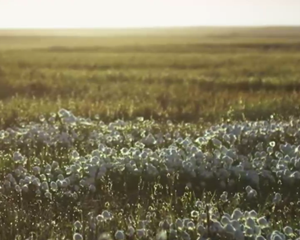The tundra has come to life once again.
冻原再次恢复生气。
But in the longer term, its very foundations are now at risk.
可是长期来看,它的根基如今摇摇欲坠。
The ground itself is giving way.
地面本身正在流失。
In some places, it's dropped by more than 60 metres.
某些区域已经下陷超过60米。
Grasslands that once supported thousands of different species have become wastelands.
曾经维持成千上万个不同物种的草地已经化为荒土。
Arctic temperatures are rising as a consequence of climate change.
北极的气温正在上升,这是气候变迁所导致。

The deep soil, which has been frozen solid for thousands of years, the permafrost, is now thawing at a rate never witnessed before.
原本冻结了数千年的深层土壤,永冻层如今正以前所未见的速度解冻。
Without the ice to bind it together, the ground becomes unstable.
少了固定土壤的冰,地面变得不稳定。
In Canada, thousands of tonnes of the tundra have collapsed in a matter of weeks.
在加拿大,数千吨的冻原在数周之内崩塌。
And in Siberia, huge scars are appearing.
而在西伯利亚,四处出现了大型疤痕。
By the end of the century, an area of arctic permafrost, one third of the size of Europe could have thawed.
在本世纪结束前,一块欧洲三分之一大小面积的北极永冻层可能会解冻。
The warming of the tundra is having a profound impact on its wildlife.
冻原的暖化对其野生动物正造成深远冲击。












